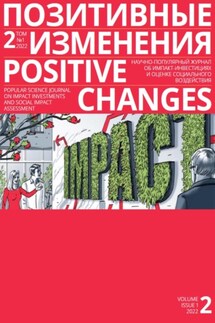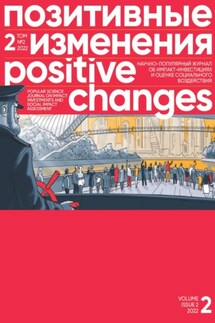Позитивные изменения. Том 1, №1 (2021). Positive changes. Volume 1, Issue 1 (2021) - страница 14
Works of Kahneman, Simon and many other researchers of the psychological approach are joined by a pursuit to find out how a choice is made in reality. The «heuristic» notion is the important category in this approach. These are simple principles, established algorithms expressed in the form of judgements, which people use to facilitate a task of decision making. Proverbs can serve as examples of heuristics. "For one that is missing there is no spoiling a wedding", "where there’s smoke there’s fire" and other proverbs actually define our behavior in certain situations, help us to make decisions – to wait or to leave, believe or not, etc. We reference to them as a principle of choosing a behavior model in certain situations.
Before we proceed to the analysis of heuristics which define a choice of social goods, first of all we should provide proofs in favour of the judgement in the title as proved one – people buy social things. Do they really buy? Do the goods of social value are "modal alternatives", i.e. a choice option which has advantages compared to others?
Hereinafter I will refer to data of the research we conducted several years ago by the order of Our Future Foundation for regional and social programmes. As Diagrams 1 and 2 show, the respondents are ready to change even the brand they prefer to buy «regularly» (this particular situation – regular purchasing is the most difficult to be changed) for the products of social entrepreneurs. Although, if we review the social desirability of this answer as a correction factor (though, in our case – anonimous online survey – the conditions minimally contributed to its occurrence), we get fairly significant ratio. Partially, the factor of "external validity", i.e. that confirms accuracy of our hypothesis, is active usage of «social» as the strategy of promotion of «regular» goods. The social marketing today represents a well-established and actively developing line of marketing, and at advertising festivals now it is difficult to distinguish the commercial advertising from the social one – humanistic values become the dominant and actively operated values both by charitable Foundations and large corporations (and it is perfect, particularly in case when these campaigns have a great effect not only commercial, but also a social one).
Are you ready to change the brand you regularly buy for the products of social entrepreneurs (made by socially vulnerable groups of citizens) with similar properties in terms of quality, etc.?
Diagram 1. Readiness to change a traditional brand for the products of social entrepreneurs, %
If you find out that goods or service are made by a socially vulnerable group of citizens (physically impaired persons, large families, etc.), how will it impact your choice of products?
Diagram 2. Impact of the factor of «social» goods on making a consumer decision, %
We will try to figure out reasons, why a choice of «social» goods is yet attractive for a consumer, from the point of view of the psychological theory of decisions.
Let’s start from the point that the situation of choice itself intrinsically and subjectively is a task that is not always a pleasant one. We say "burden of choice" in a situation when we have to make an important decision. Although, a pleasant for us choice – a choice of a new dress, for instance – induces tension (what if the dress I buy not the best one and later I will find a cheaper and better one?), let alone a choice of a new flat, profession, and on top of that, a life partner. All these situations require costs of our mental resources and besides go along with a fear to make a wrong choice.





